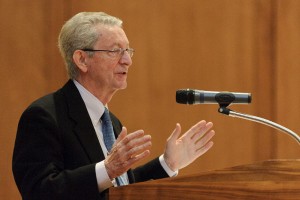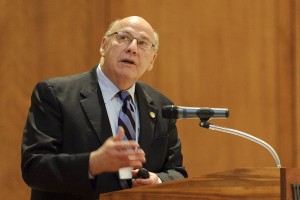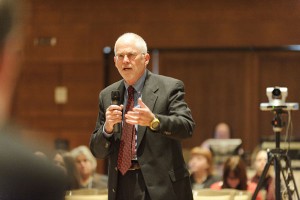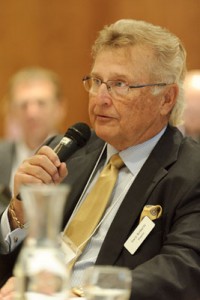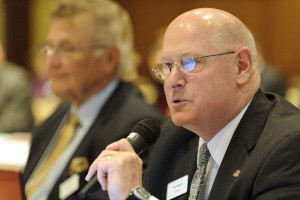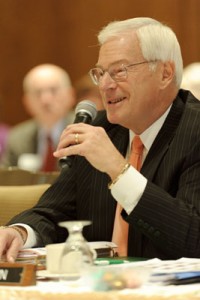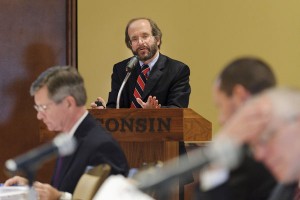MADISON – Public universities need to develop a new strategy to remain competitive and advance their vision, University of Wisconsin-Madison’s David Ward told the UW System Board of Regents on Thursday.
The Interim Chancellor told the Board that a “joint stewardship” between the University’s governing board, faculty, staff, students, and legislative interests is what’s called for to face the persistent funding gap.
“We must be a key part of the solution,” Ward said. “And out of that, perhaps, a partnership and a stewardship can be reconnected, so that (in) the public partnership that is so critical to our survival, people will feel empowered to reinvest.”
Ward, who formerly served as the president of the American Council on Education, told Regents that while the UW has faced many ups and downs in state funding over the years, he believes the pendulum of public funding support may not swing back in the university’s favor this time.
“All of us in higher education really did believe it was a pendulum, you could survive bad times because the good times would return. The problem is … the pendulum is no longer swinging. It’s now lying on the ground. That’s a fact, a reality we have to face,” Ward said.
“We understand the magnitude (of the problem) but the nature of the responses, I think, we are less clear about,” he said.
Looking forward, philanthropy and research and technology transfer will have to be creative – and more significant – parts of the university’s base budget, Ward said.
Provost Paul DeLuca told Regents that UW-Madison is targeting three areas for potential improvement: greater effectiveness and efficiencies in the administrative infrastructure, educational innovation; and dramatically improving the transfer of discoveries into the marketplace.
Regent Judy Crain expressed interest in how other universities are facing similar challenges. DeLuca noted that Stanford University is a good example of public and private research coming together to enhance the ability to commercialize new ideas. The Wisconsin Institutes for Discovery emulates this model, he said. He added that University of Michigan offers a hospitable climate for “serial entrepreneurship,” which Wisconsin currently lacks. “That’s key to this success,” he said.
- See UW-Madison PowerPoint presentation – “ “
UW-Madison’s Aaron Brower presented to the Education Committee examples of Educational Innovation already underway on the campus, and the strategies for engaging faculty and staff in the effort.
Brower, Vice Provost for Teaching and Learning, said the goal is to unleash the entrepreneurial energy of faculty and staff on the project. “There is unlikely one home run that closes this gap,” Brower said.
Brower said there are models for successful innovations already in evidence at UW-Madison. For example, the School of Social Work collaborated with UW-Eau Claire to develop a part-time master’s program, generating revenue for the school. In another example, the School of Medicine and Public Health consolidated three departments into two, modernizing its curriculum and finding administrative efficiencies.
As an incentive to finding efficiencies, the departments are promised that they will keep two-thirds of the savings or new revenue they generate. Ideas can be department-focused, such as updating curriculum or developing distance learning programs, or can encompass broader initiatives, like changing the semester structure to use all 12 months of the year in a more efficient way.
“We are trying to give our campus the license to be creative and efficient,” he said.
- See UW-Madison PowerPoint presentation – “ “
Chancellor David Ward told a joint session of the Business, Finance & Audit and Capital Planning & Budget committees that UW-Madison has looked at a variety of ways to fill the gap in funding, but said it’s also important for the university to look at how it uses the resources it has.
“In the short term, self-help is one of the few ways we can cope with what is going to be five or more difficult years,” Ward said.
Darrell Bazzell, UW-Madison Vice Chancellor of Administration, noted UW-Madison has been on a journey for many years around process improvement, including the Office of Quality Improvement and Administrative Process Redesign.
This latest effort includes the work of Huron Consulting, a private company hired to examine UW-Madison’s efficiency, as well as steering and advisory committees, campus stakeholders and Administrative Process Redesign office. Huron identified 75 opportunities for saving money and improving processes, and Bazzell says UW-Madison is implementing five areas right away that have best chance of succeeding and building momentum for additional improvements.
For example, UW-Madison operates more than 72 email systems across campus. Bazzell says the university could save up to $1 million a year by moving to a common system for email and calendaring.
The university also has four data centers and serves all over campus. Bazzell said aggregating those could save up to $500,000 a year. “In this day and age it might be comfortable to have the server in a closet next door, but with the technology available there’s no need to do that,” he said.
Regent Jeffrey Bartell commented on the scope of the effort, calling it “ambitious and impressive.”
“It’s critical that we engage in this re-examination,” Bazzell said. “It’s aggressive. It comes with some risks for sure, but given where we find ourselves at this particular place and time we believe these are the right activities to engage in.”
Changing Regent responsibilities and leadership roles
To provide background and context for UW System’s evolving governance and operational roles, higher education expert Terrence MacTaggart offered Regents an informal “workshop” on changing Regent responsibilities and leadership roles from a national perspective.
MacTaggart recently served as committee facilitator for President Reilly’s Advisory Committee on the Roles of UW System Administration. He is a former Chancellor of UW-Superior, and a former CEO of both the Minnesota State University System and University of Maine System.
MacTaggart noted that higher education boards serve dual roles of providing governance and “brain power.” Confusing those two roles is a common pitfall for engaged boards, he said.
He added that in times of change, board members should expect “pushback” from multiple constituencies. “That’s where the board steps up to the plate and asserts its authority,” MacTaggart said. At the same time, boards must remain cognizant of making decisions that take into consideration those who have to implement them. “Structure is not as important as trust,” he said.
He added that as Regents look at evolving roles, they might also consider whether some of their actions could be delegated to others, allowing them to focus on larger issues. MacTaggart observed that the Board’s current agenda appears to focus more on action items, rather than longer-term goals or initiatives such as the Growth Agenda. “This has to be about revitalizing the state of Wisconsin,” he said. “Breaking the mold is the hardest thing to do.”
Presidents Report
Regent President Michael Spector reported that the three recently appointed Regents – Tim Higgins of Appleton, Gary Roberts of Onalaska, and Gerald Whitburn of Wausau – would be appearing before the Senate higher education committee Thursday afternoon for their confirmation hearings.
He also noted that Gov. Scott Walker had recently signed Senate Bill 28, requiring regional representation on the Board of Regents. He reminded Regents that the Board had endorsed this idea last spring, and that the current Board already represents 7 of the state’s congressional districts.
Regent Mark Bradley reported that the Ad Hoc Committee on Board Responsibilities, which was appointed by President Spector earlier in the fall, would be providing a full report on its finding at the Board’s February meeting. “We’re making great progress,” Bradley said.
Wisconsin Partnership Program provides annual report
UW-Madison’s Robert Golden, Dean of the School of Medicine and Public Health, presented the 2010 Report of the Wisconsin Partnership Program (WPP) to a joint session of the Budget, Finance & Audit Committee and the Education Committee.
Golden reported that the Wisconsin Partnership Program has been successful in calling attention to major public health challenges in the state by undertaking strategic initiatives as well as by engaging communities as full partners in the search for effective outcomes.
- View the
The program made 23 grants totaling $3.75 million in 2010, including continued support for the Lifecourse Initiative for Healthy Families (LIHF), a major strategic initiative to improve birth outcomes in Wisconsin’s African-American community, which is among the worst in the nation.
Other initiatives receiving support include community-academic partnerships focused on improving health in Wisconsin communities, addressing issues such as improving access to care, bringing dental care to underserved areas, promoting physical activity and healthy weight, and preventing alcohol abuse.
Golden said the WPP’s priorities going forward include recruitment of a maternal and child health expert to provide faculty leadership for the Lifecourse Initiative; developing a major inter-disciplinary initiative addressing obesity and diabetes; and continuing to build on the on-campus public health curriculum, and extending the statewide reach to public health practitioners and community leaders.
- View the
Regent Chuck Pruitt asked what the impact of funding cutbacks has been on WPP’s work. Golden noted that while the program’s endowment is substantial, there is no way it can fill in the gaps created by shortfalls in public funding. “It makes it that much more vital we leverage the resources we have,” Golden said. “If we can fund a good program, that’s fine. But if we can fund a program that will then allow us to get a larger slice of the diminishing federal pot, that’s even better.”
Regents recommend approval of UW-Milwaukees China agreement
In a joint session of the Business, Finance & Audit Committee and the Education Committee, the Regents unanimously recommended approval of an agreement between UW-Milwaukee and CERNET Education Development Co., to recruit Chinese students to UWM’s Intensive English Program.
Under the agreement, UWM will provide a one-year Intensive English Program, fully integrated with UWM’s existing English as a Second Language program, to help qualified Chinese students achieve English proficiency so they can become fully matriculated academic degree-seekers at UWM.
UW-Milwaukee Chancellor Mike Lovell said that anticipated benefits of the program include a more globally engaged university, enhanced student diversity on campus, and more non-resident tuition revenue.
Lovell told Regents UWM would be a “better, stronger campus by doing this.”
Dev Venugopalan, UWM’s Associate Vice Chancellor for Academic Affairs, said the enrollment goal for 2012-13, the initial year of the program, would be 30-50 CERNET students, growing to 250 students by 2015. He added that it’s expected 75% of CERNET students would enter a degree program at UWM upon achieving English proficiency.
The anticipated net revenue of the program given a conservative estimate of 150 students enrolling and 75% matriculating a degree program would be $13 million by 2017, Venugopalan said.
Regent Chuck Pruitt wondered if any Wisconsin students would be displaced by CERNET students. Chancellor Lovell noted that the opposite, in fact, would be true. “With the increased revenue, we’ll be able to offer more spots, more aid to Wisconsin students,” he said.
UW System President Kevin Reilly, who was part of a trade mission to China last year, said that the CERNET program “is not just good education and finances for Milwaukee, it’s good foreign policy for America.”
- See
Education Committee
UW-Parkside to establish three new colleges
The Education Committee approved UW-Parkside’s request to establish three new colleges: the College of Arts and Humanities, the College of Natural and Health Sciences, and the College of Social Sciences and Professional Studies.
UW-Parkside Provost Terry Brown said the establishment of the three new colleges are part of an overall academic restructuring aimed at growing enrollments, increasing graduation rates and increasing the array of programs the university offers to meet the needs of the region.
The reorganization will happen in two phases, Brown said. In the first phase, beginning in fall 2012, the College of Arts and Sciences will be divided into the College of Natural and Health Sciences and the College of Arts and Humanities. Also in the first phase, the School of Business and Technology will be renamed the College of Business and Technology. Beginning in fall 2013, the College of Social Sciences and Professional Studies will be established and will include the new Department of Education, which will be responsible for teacher education.
Brown said the restructuring makes good sense in terms of academic divisions, but also makes good business sense. It provides a more balanced distribution of administrative workload and provides each college with “focused and accountable leadership,” she said.
“We firmly believe in order for us to achieve the performance goals we set for ourselves we must invest in a new organizational model,” Brown said.
Report of the Senior Vice President
Interim Senior Vice President Mark Nook provided the Education Committee with an overview of the integration of Academic Affairs initiatives and how they fit into the context of the UW System’s Growth Agenda for Wisconsin.
Nook said the initiatives can be divided into two fundamental areas: college readiness and educational attainment. Many of the initiatives have been ongoing for quite some time and are joint efforts with federal organizations or are funded through philanthropy or federal grants, he said.
“All of these are really an outgrowth of the Growth Agenda,” he said.
Nook also gave a report on the Institute for Urban Education, which was created in response to the need
expressed by the Board of Regents and identified by the UW System Deans of Education to better prepare teachers to work effectively in urban settings. The institute received GPR/Fee funding in the 2007-09 biennial budget and was implemented in 2007. Since, 125 student teachers from eight UW institutions (UW-Eau Claire, UW-La Crosse, UW-Madison, UW-Oshkosh, UW-Platteville, UW-River Falls, UW-Stevens Point, and UW-Whitewater) have been enrolled in the institute. The plan is to put together a request for proposal from all System universities who wish to have an Institute for Urban Education on their campus, he said.
UW-Eau Claire updates campus Master Plan
In a joint session before the Education and Capital Planning and Budget committees, UW-Eau Claire officials updated Regents on the campus Master Plan. They noted that the plan strives to balance opportunities for the development of new academic and student life facilities, the demolition of obsolete buildings, the renovation of existing facilities, infrastructure and transportation improvements, the acquisition of additional land, and open space preservation and enhancements.
Chancellor Brian Levin-Stankevich said the goal is to integrate the campus into the Eau Claire community, physically and programmatically. When Levin-Stankevich arrived on campus six years ago, “the quality of the facilities did not match the quality of the instruction and learning.”
It has been 30 years since the last new building was constructed on campus. The next one, a new education building, will be complete in 2012. Residential neighborhoods and institutional neighbors hem in campus boundaries and the university needs the ability to move out into the community, Levin-Stankevich said. New buildings can only come from public-private partnerships, he said.
For decades, UW-Eau Claire has housed students in hotels and the occupancy rate for its resident halls is 108 percent, with some students living in study halls and resident assistants having roommates. Campus officials have determined the need for 1,250 suite beds, and an additional 300 beds to move students from the hotels back to campus.
- See
Business, Finance, and Audit Committee
UW institutions are meeting FERPA requirements
Elizabeth Dionne, Director of the UW System Office of Operations Review and Audit, updated Regents on a recently completed program review by the Audit Bureau of the University’s implementation of Family Educational Rights and Privacy Act (FERPA) regulations.
She said the review concluded that UW institutions are generally meeting FERPA requirements. To enhance their ability to implement the law’s provisions, she reported that the Audit Bureau offered several recommendations, including increased training for individuals who have access to student educational records, and centralization and review of FERPA policies.
- See
Dionne also provided the Committee with a quarterly update on current and/or pending activities of the Legislative Audit Bureau, including NCAA Division III Athletics – La Crosse; Policies Affecting Students with Disabilities; NCAA Division III Athletics – Eau Claire; Undergraduate Academic and Career Advising; and Privacy Controls Related to Personally Identifiable Information.
In other business, the Committee:
- Heard a report from Michael Morgan, Senior Vice President for Administration and Fiscal Affairs, that “good progress” is being made on implementing new flexibilities included in the 2011-13 biennial budget as well as recommendations from the Advisory Committee;
- In a joint session with the Education Committee, heard a report from Elizabeth Dionne, Director of UW System’s Office of Operations Review and Audit, that UW institutions generally meet the Board’s policy objectives of providing equal access to University programs and services for students with disabilities;
- Approved the extension of a Data Research Analysis Agreement between UW-Madison and Sunovion Pharmaceuticals, Inc., through December 2014;
- Approved changes to the way certain asset categories are defined, some minor revisions to the Investment Policy Statement, and generally reaffirmed its adoption of the Investment Policy Statement for the University of Wisconsin System Trust Funds; and
- Heard a quarterly report on gifts, grants, and contracts.
Capital Planning & Budget
UW-Madison building plans advance
The committee approved UW-Madison’s request for authority to demolish and remove five storefront buildings on University Avenue using Building Trust Funds, in anticipation of the construction of the new Music Performance Facility, as indicated in the 2005 Campus Master Plan.
Demolition is scheduled for summer 2012 to prevent further blight. Until the design is complete and UW-Madison breaks ground on the project, the area will be seeded and landscaped for open space. All of the buildings on the block are empty, except for Brother’s Bar.
“Are we at peace with Brother’s Bar?” Regent Jeffrey Bartell asked Alan Fish, UW-Madison Vice Chancellor for Facilities Planning & Management
Fish said the bar’s owners are leasing from UW-Madison, and that arrangement could be extended until May as they search for an alternate location. “It’s a nice result after all we went through,” Bartell said, referring to previous legal battles.
The committee also approved UW-Madison’s request for authority to construct the $52-million Memorial Union Theater Wing Renovation-Phase I Project. Fish said the new design of the Union Theater lobby space addresses student and public concerns, based on 14 open forums held since August. “We think we have really responded to the concerns that people had,” Fish said.
“I think this is a great model and most people will be happy with it,” said Regent Katherine Pointer, a UW-Madison student.
In other business, the Committee:
- Approved UW-Eau Claire’s request for authority to modify its campus boundary;
- Approved UW-Madison’s request for authority to construct the $10M Carson Gulley Renovation Project, replacing all plumbing, mechanical, and electrical systems in the existing building, which was constructed in 1926;
- Approved UW-Madison’s request for authority to construct the $2.9M gift-funded Kohl Center South End Club and Audio/Video Relocation Project;
- Delayed taking up UW-Platteville’s request for authority to enter into a land use agreement with the UW-Platteville Real Estate Foundation for the purpose of constructing a residence hall and a dining facility due to a number of legal and policy issues;
- Approved UW-River Falls’ request for authority to request the release of building trust funds to continue planning the Health and Human Performance/Recreation Building Project;
- Approved UW-Superior’s request for authority to enter into land lease agreements and to acquire real property for the long-term operation of the Lake Superior National Estuarine Research Reserve;
- Approved a request by UW System for eight All Agency Maintenance and Repair projects on six campuses totaling about $10.6M, which includes reconstructing the limestone stairs at the Memorial Union lakeshore;
- Approved UW System’s request for approval of the UW System Criteria for Ranking General Fund Major Projects;
- Heard a report from Associate Vice President David Miller on the October actions of the State Building Commission; and
- Recognized Al Fish, who is leaving UW-Madison for a position at Johns Hopkins University.
Photos by Jeff Miller, senior photographer at UW-Madison
###
The UW System Board of Regents will resume its December 2011 meeting at 9 a.m.
on Friday, December 9, at Union South, UW-Madison
Related: Read December 9 (day 2) news summary

